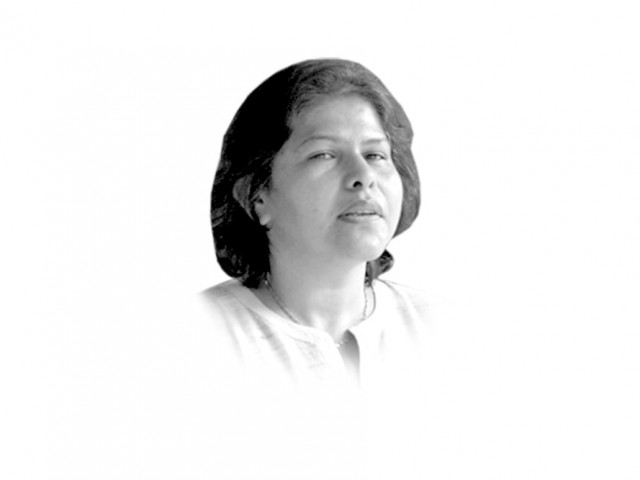Manmohan Singh, Nawaz Sharif and the ‘dehati aurat’
Our years of manliness haven’t taken us very far.

The writer is an independent social scientist and author of Military Inc.
Many people wondered what was most provocative — dehati or aurat? Given the Punjabi or general South Asian culture, the term dehati or villager seems to be an icing on the cake with the main intended insult being aurat. It’s almost everyday that one hears terms that tend to differentiate between a man and a woman. Bravery is equal to being a man, not a woman. Thus, being a woman is akin to being soft, cowardly, unable to take decisions, someone who engages in backbiting and endless gossip, and will eventually turn to a strong male shoulder when in trouble rather than decide something on her own.
Despite that such a description will upset my feminist friends, let’s for minutes assume that these are indeed characteristics that describe the nature of a woman. But the question is, why does a woman behave thus? Since an average woman is physically softer than a man or is socially dependent upon male help, she tends to seek assistance from outside every time she feels threatened. The gossiping, the habit of involving others in her decisions, the inability to stand up and punch someone in the face and so seeking help of others, is her way of protecting herself and her interests. I am sure what a woman does to protect her household is unbelievable. To top it all, a dehati aurat is a very suave specie, who knows exactly where her interests lie and how she will manoeuvre to protect herself and those close to her. Let’s also imagine for a minute that the term dehati aurat is a concept and not just a reference to a particular person.
So, why does Mian Nawaz Sharif think that being a woman is derogatory because he did himself, what he is now implying a dehati aurat would do, many years ago? Surely, he still remembers how he rushed to the US to stop the Kargil conflict, a misadventure that even some senior commanders in the military admit was too risky and shouldn’t have been done. Could Pakistan have afforded to be more manly then and prolonged a fight that it simply couldn’t, especially with innocent soldiers stuck at the glacier without supplies?
In Pakistan’s security establishment’s estimation, Manmohan Singh should have been more manly and withstood immense pressure from the political opposition, the security hawks and India’s larger security community, which is now dominated by military thinking but not necessarily, the military as an organisation. The fact is that civil-military relations in all South Asian states have undergone a shift towards a more proactive military approach, which essentially reflects the growing militarism in all societies. The larger security establishment in India is averse to taking peace overtures by Nawaz Sharif, who is seen as a well-meaning leader on face value since the assumption is that he may not be in total control of security policymaking. Indeed, if the Sharif government has tasked the National Defence University to make the national security policy with minimal civilian intervention, then the GHQ has greater power than the political government.
It might have helped if we had village women in charge of policymaking on both sides. At least, there would have been more caution than adventure. Speaking from a woman’s logic, it may seem difficult for someone to trust a situation where every peace initiative is doomed due to some military or semi-military adventure. The Lahore Declaration followed by Kargil and Musharraf’s peace overtures by Mumbai can throw anyone off-balance. This is not to suggest that the Indian government is very innocent but then, diplomacy is not an issue of innocence versus evil but how interests are gauged.
Our years of manliness haven’t taken us very far. At the UN, Nawaz Sharif spoke about the Kashmir issue being resolved according to UN resolutions. This position is different from what was proposed by former president and army chief Pervez Musharraf. Even earlier in 1998, the then Sharif government had agreed on a comprehensive dialogue rather than a Kashmir-first approach. Surely, this flip-flop has confused many. Forget about the Indians, it is very confusing to average Kashmiris as well, especially on the Indian side, who have experienced a gradual weakening of their own position versus New Delhi due to variations in Pakistani policies. The hanging of Afzal Guru is a reflection of the strengthening of the Indian security community’s perspective. The relative consolidation of the Indian state’s position versus the Kashmiri population has happened also because of a realisation regarding Islamabad’s general fickleness and inability to negotiate the issue on its own terms.
Referring to Pervez Musharraf, he realised even after doing Kargil that direct military means was not an option. Of course, the other possibility is giving a free hand to non-state actors, which is something that would scare anyone into adopting a very cautious approach in bilateral relations. Twenty-Fourteen is a likely game changer for the entire region. This is a time when militants will gather more strength and legitimacy due to their involvement at multiple fronts. Even the Kashmiris are concerned that there may be an increase in violence on their side. A growing internal discontent will play into the hands of the jihadis.
From a bilateral perspective, it is necessary for leaders to adopt a more cautious approach towards each other. Mian sahib may deny the state’s assistance to Hafiz Saeed and the likes but the ground reality scares others into caution.
Published in The Express Tribune, October 3rd, 2013.
Like Opinion & Editorial on Facebook, follow @ETOpEd on Twitter to receive all updates on all our daily pieces.













COMMENTS
Comments are moderated and generally will be posted if they are on-topic and not abusive.
For more information, please see our Comments FAQ